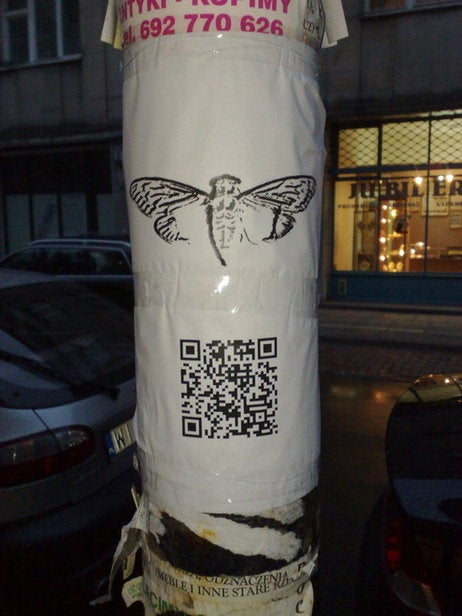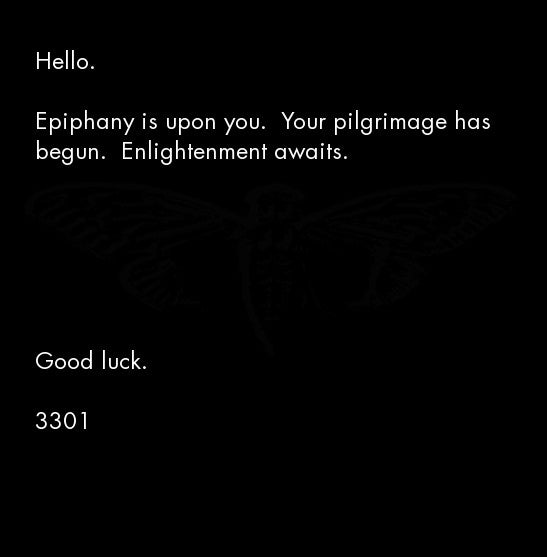Masonic conspiracy or MI6 recruitment tool? Internet mystery Cicada 3301 starts up again
The international puzzle that requires knowledge of steganography, Aleister Crowley and the darknet is back again, and the internet is just as confused
v2.jpg)
A mysterious cryptography competition that claims to be searching for “highly intelligent individuals” has apparently started a third annual round of recruitment.
Cicada 3301 (the name given to both the scavenger hunt and the unknown organisation responsible for the puzzles) first began in January 2012, baffling participants with a series of puzzles and codes spread across the internet and various locations worldwide.
It’s been suggested that the challenge is an elaborate marketing campaign or perhaps a recruiting tool for the likes of MI6 or the CIA to find bright young hackers. Global interest in the story has heightened following recent articles including Chris Bell's for The Telegraph, but the motives – and organisers – of Cicada 3301 remain a mystery.
So far two ‘rounds’ have been played in 2012 and 2013, but no-one who has cracked the final code has reported on what they found. However, this might all be about to change with the latest competition promising would-be cryptographers that “enlightenment awaits.”
The first ever image associated with Cicada 3301 was posted to a paranormal discussion board on the website 4chan:
“Hello. We are looking for highly intelligent individuals. To find them, we have devised a test. There is a message hidden in this image. Find it, and it will lead you on the road to finding us. We look forward to meeting the few that will make it all the way through. Good luck. 3301.”

With that the scavenger hunt began, and this first message was followed by a trail of clues requiring knowledge of a range of arcane topics. An interest in Mayan numerology proved handy, as did insight into Victorian occultism; QR codes were tracked down pasted to lampposts in cities from Russia to Spain; a telephone number played out eerie audio clues to callers, and a flair for steganography (the art of concealing information in images) proved to be a must-have.
But why 'Cicada 3301'? The name comes from two motifs that repeatedly appear in clues: a picture of a cicada (as seen in the stencil above) and the number '3301', often used a signature by the puzzles' anonymous creator.
The connection between the two signs are prime numbers, or numbers that are only divisible by 1 and themselves: 3301 is a prime (as is 1033) and the cicada is a creature that naturally expresses primes, with species posessing either a 13- or 17-year life cycle. Both digits are prime numbers, and it's thought that this is adaptation was developed in order to confuse predators who might look for regular patterns in the creatures' appearance.
Prime numbers are themselves important because they are indispensable to many cryptography algorithms. Because there are no mathematical formulas that accurately predict which numbers will be primes, individuals can multiply two prime numbers together and use the result as a 'public key' that cannot be easily reverse-engineered. It's similar to the idea that you can easily create colour X by mixing colours A and B, but if you onl knew colour X, you wouldn't know which two colours had been combined to create it.
Eventually in 2012 a website address in the “darknet” (a collection of websites inaccessible without special software and often associated with criminal activity) was unearthed as the ‘final’ destination of Cicada 3301, but after an unknown number of visitors viewed the site itself shut down, offering the message "We want the best, not the followers."
“We have now found the individuals we sought,” the game’s organizers announced in a separate message weeks later. “Thus our month-long journey ends. For now. Thank you for your dedication and effort. If you were unable to complete the test, or did not receive an email, do not despair. There will be more opportunities like this one.”
A second hunt started on 4 January in 2013 and ended in the same way, but now it appears that a third round has begun. On 6 January an image was posted by a Twitter account associated with Cicada 3301, including the following text:

“Hello. Epiphany is upon you. Your pilgrimage has begun. Enlightenment awaits. Good luck. 3301”
A Wiki dedicated to unravelling Cicada 3301 has already found a stegnographic message in the image that offers the following quotation: "The work of a private man/ who wished to transcend,/ He trusted himself, / to produce from within."
This then led to an essay by the American poet and transcendentalist Ralph Waldo Emerson, and then on to another picture clue – a collage of artworks from The Marriage of Heaven and Hell, a book of poetry and illustrations by William Blake.
As with previous hunts it seems that the creators of Cicada 3301 have a distinct taste for 19th century philosophy, especially that which is concerned with inner spirituality, unconventional morality and ideas of the self.
However, whether or not this is anything more than an intricate form of navel-gazing remains to be seen and for those not dedicated to following Cicada 3301's clues themselves, the “enlightenment” promised by this year’s hunt seems a way off yet.

Readers interested in the technical details of the Cicada 3301 challenge can click here to read more.
Join our commenting forum
Join thought-provoking conversations, follow other Independent readers and see their replies
Comments
Bookmark popover
Removed from bookmarks